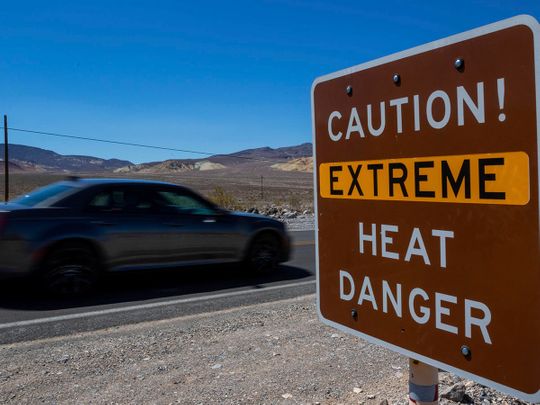Nearly five times more people are likely to die from extreme heat on Earth in the coming decades, international experts warn in a report released Wednesday, warning that “the health of humanity is in grave danger” if nothing is being done about climate change.
Under the scenario of global warming of 2°Celsius by the end of the century (it is currently on track to reach 2.7°C by 2100), annual heat-related deaths are expected to increase by 370% by 2050, i.e. a 4.7-fold increase, according to the 2023 edition of a reference document published every year by the medical journal “The Lancet”.
And fatal heat is just one of the threats to human health arising from the growing use of fossil fuels, confirms this “countdown on health and climate change” a few weeks before the international climate conference (COP28) in Dubai, where, for the first time, a day will be dedicated to health, on December 3.
More frequent droughts putting millions of people at risk of starvation, mosquitoes traveling further and carrying infectious diseases, health systems struggling to cope with the burden are among the other dangers highlighted in this report, which presents 47 indicators.
Despite ever-increasing calls for global action, energy-related carbon emissions reached new heights last year, lament the authors of the report, who single out governments, companies and banks that still subsidize and invest massively in fossil fuels fueling global warming.
“Early symptom”

In 2022, people around the world were exposed, on average, to 86 days of life-threatening temperatures, according to the Lancet “countdown.” And the number of people over 65 who died due to heat jumped by 85% between 1991-2000 and 2013-2022, this report estimates.
These estimates come as 2023 is set to be the hottest year in human history: the European Climate Observatory said last month was the hottest October on record.
“The effects observed now could be just an early symptom of a very dangerous future,” Marina Romanello, executive director of the report, told reporters.
In the scenario of 2°C warming by 2100, the impact on human health would exceed excess mortality. About 520 million more people would find themselves moderately or severely food insecure by mid-century, according to projections published by the Lancet.
And infectious diseases spread by mosquitoes would continue to spread to new areas. Dengue transmission could thus jump by 36%. Faced with these multiple impacts of climate change, more than a quarter of the cities studied by the researchers expressed fear of overwhelmed health systems.
“Unbearable future”
“We are facing crisis after crisis,” Georgiana Gordon-Strachan, whose native Jamaica is experiencing a dengue epidemic, told the report’s authors. And to emphasize that “the inhabitants of the poorest countries, often less responsible for greenhouse gas emissions, pay the price of the impacts on health, but have less financial and technical capacity to adapt to deadly storms , rising seas or devastating droughts, worsened by global warming.
United Nations Secretary General Antonio Guterres, who continues to warn about climate change, responded to the report by judging that “humanity faces an unbearable future”. “We are already seeing catastrophe for the health and lives of billions of humans around the world, endangered by record heat, crop-destroying droughts, growing famines, growing outbreaks of infectious diseases, storms and deadly floods,” he said in a press release.
Dann Mitchell, chair of climate risks at Britain’s University of Bristol, lamented to the Science Media Center that “already dire” health warnings about climate change have “failed to convince governments to reduce enough carbon emissions to meet the first objective of the Paris Agreement, i.e. +1.5°C”.
For Marina Romanello, without real progress against climate change and emissions, “the growing emphasis on health in climate negotiations risks being limited to empty words”.


